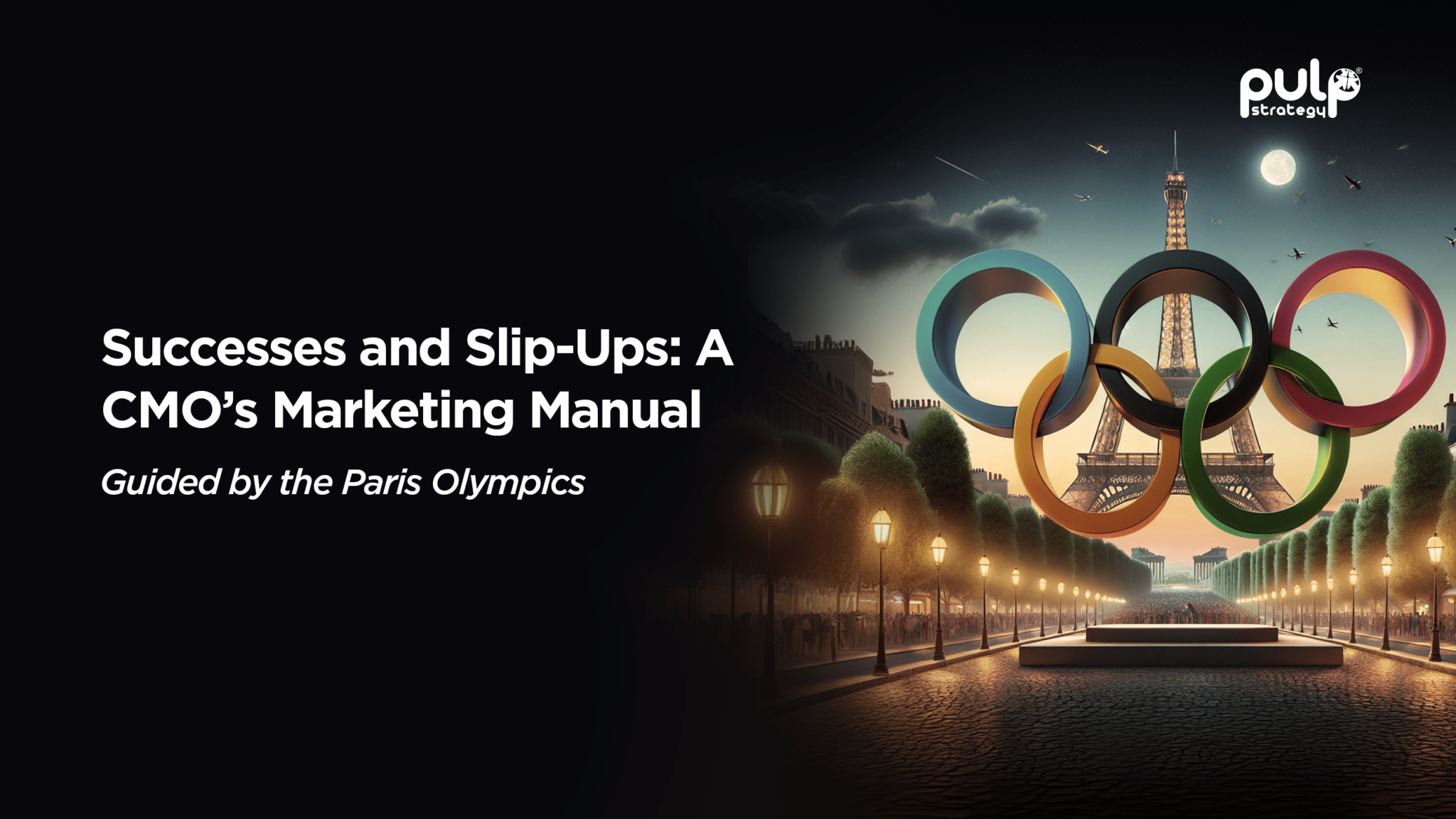Think of it as your go-to $9.7 billion manifesto for marketing success, straight from the Olympic stage.
The Paris Olympics isn’t just about athletic feats; it’s a global showcase of creativity, strategy, and impact for marketing leaders everywhere. With over 4 billion people tuned in, it's the perfect stage to witness cutting-edge strategies in action. From tech innovations to powerful narratives, it offers key lessons for businesses to level up their marketing game.
Let’s dive into these takeaways and unlock gold medal-worthy marketing!
Creative Genius: Reimagining the Marketing Playing Field

The Paris Olympics demonstrated that creativity is about pushing boundaries rather than sticking to the familiar. This year, they boldly redefined the sports spectacle by introducing fresh, youth-centric sports like skateboarding, surfing, and breakdancing. The opening ceremony turned Paris into a stunning open-air arena, blending themes of Liberty, Equality, Fraternity, Sorority, and Sportsmanship into a visual masterpiece. Every detail highlighted creative thinking, from the Olympic cauldron envisioned as a hot air balloon to the eye-catching logo and one-of-a-kind mascots.
But with every daring leap comes the risk of a painful fall. The depiction of Leonardo da Vinci's "The Last Supper" in the opening ceremony, featuring a "drag queen" performance, invited negative repercussions for being disrespectful to religious beliefs. Thus, disruption on a global platform demands scale and grandeur of equivalent scale. Remember that creativity without sensitivity can backfire.
Key Lesson: Creativity isn’t just about thinking outside the box; it’s about redefining the box itself. Foster a culture of experimentation and risk-taking within your team. Encourage them to move beyond traditional marketing channels and explore innovative ways to engage your audience and craft campaigns that stand out. But ensure that the creative risks you take are culturally and socially considerate. Always weigh the potential for the flip side and plan accordingly to maintain the “wow” factor without alienating your audience.
Strategic Partnerships: The Ultimate Power Play

The Olympic Games exemplify global unity, made possible through countless partnerships. The event itself is a massive collaborative effort, with international sponsors and partners contributing over 30% of the International Olympic Committee’s revenue. These partnerships are crucial, not only in making the Olympics a reality but also in fostering meaningful engagement and development within societies globally. Thus, these strategic alliances not only help make the event successful but also offer benefits for everyone involved.
However, partnerships must be carefully managed to ensure that all parties understand and respect the same values and ethos they are promoting. The Ceremonies Artistic Director’s controversial parody of the Last Supper drew widespread backlash, threatening to undermine the very partnerships that helped bring the Games to life. This highlights the importance of aligning values and being mindful of cultural sensitivities when forming partnerships.
Key Lesson: Effective partnerships don’t just extend your reach; they align with your core values and amplify your message. Identify potential partners with shared goals and values, establishing clear, mutually beneficial agreements. Co-create campaigns that harness both brands' strengths to engage a wider audience. When done right, these strategic partnerships can bring fresh ideas and innovations, driving both parties toward success while also being culturally sensitive and respectful. Don’t forget that even the strongest alliances can crumble if values misalign.
Narrative Build-up: Crafting Resonant Stories that Win

The Olympics is a stage for powerful narratives. From underdog triumphs to inspiring journeys, these stories instantly connect with audiences. It’s more than just watching athletes compete; it’s about sharing their dreams, fears, and victories. The Paris 2024 Olympics elevated this experience by spotlighting athletes' personal stories on social media and showcasing behind-the-scenes moments, training rituals, and real-life glimpses. Moreover, the Summer Games continued its storytelling tradition by perfectly capturing the city’s spirit.
Despite these efforts, there were instances where the narrative didn’t align with expectations, leading to missed opportunities for deeper engagement. Besides, the narrative stumbled when certain elements, like the controversial opening ceremony, overshadowed the intended message. Moreover, while the event excelled in showcasing athletes' personal journeys, it also highlighted the potential pitfalls of over-promising and under-delivering. The pressure to create viral moments can lead to inauthenticity.
Key Lesson: Every brand has a story to tell. The question is, is it a story worth listening to? Build true narratives that highlight real challenges and solutions relevant to your audience. Use a mix of formats (videos, blogs, case studies) to keep your content dynamic and engaging. By humanizing your brand and sharing authentic stories, you can forge deeper connections with your audience.
Sustainability: Gaining the Competitive Edge with Impact

Paris 2024 has set a new standard for eco-consciousness, branding itself as the “most sustainable Olympics ever.” The Games are on track to cut their carbon footprint in half compared to previous editions, largely by minimizing new constructions and focusing on repurposing existing sites. A standout example is the €1.4 billion initiative to clean up the Seine River, turning it into a swimming venue and showcasing a profound commitment to environmental restoration. The Games also championed renewable energy, promoting public transport and sourcing food sustainably.
However, the reality on the ground—cardboard beds, subpar athlete accommodations, and pictures of athletes sleeping outdoors—tarnished this green image. It's a classic case of good intentions gone awry. This serves as a reminder that sustainability must be practical and ethical, not just a marketing buzzword.
Key Lesson: Sustainability isn’t a trend; it’s the future of brand integrity. Take a page from Paris 2024’s playbook by embedding sustainability into their business strategies. Integrating eco-conscious practices into your core operations not only strengthens your brand's reputation but also aligns with the values of modern consumers and businesses, ensuring long-term success. But eco-friendly initiatives should be balanced with practicality and ethics to avoid undermining your brand’s credibility.
Technology and Innovation: The Real Game-Changer

One of the event's most notable highlights has been the effective use of technology, particularly AI. From AI-powered chatbots greeting athletes to real-time data enhancing the viewing experience, this year’s Games have redefined innovation. The use of AI isn’t just for show; it’s making the Olympics more personalized, engaging, and immersive. Whether it’s AI-driven refereeing or the 15 unique augmented reality features available to fans both online and on the streets of Paris, the Games have set a new benchmark for how technology can amplify engagement.
While these innovations captivated us, they also exposed vulnerabilities, reminding us that technology is a double-edged sword. With rapid technological advancements comes the risk of over-reliance on tech at the expense of the human experience. There were instances where technology, such as AI-driven tools, created friction or confusion rather than enhancing the experience. This highlights the need to balance innovation with usability and to ensure that technology serves to enhance, not detract from, the overall experience.
Key Lesson: Technology is a canvas for creating memorable and interactive experiences. Don’t just keep up with technological advancements—lead with them. Leveraging AI allows businesses to gain deeper insights, personalize campaigns, predict market trends, and optimize targeting. The future of marketing lies in adapting and integrating cutting-edge technology into every facet of your strategy, as the Paris Olympics have shown. But always keep in mind that technology without a human touch is just cold logic.
Diversity and Inclusion: A Global Stage for All

The Olympics is a global celebration of diversity, uniting athletes from every corner of the world and showing a myriad of backgrounds and cultures. The Paris Summer Games elevated this inclusivity to new heights with gender-balanced events and unprecedented representation of nations. Additionally, the event's motto, "Games Wide Open," reflects its dedication to accessibility and inclusivity. This commitment is further exemplified by the establishment of a Pride House, which supports the LGBTQ+ community through a variety of activities.
Despite strides in athlete diversity, gaps remained in operational and managerial roles, particularly in broadcasting. Reports of gender bias, including sexist remarks from commentators and incidents of harassment of women athletes by cameramen, reveal that diversity needs to be more comprehensively addressed across all aspects.
Key Lesson: Inclusion in marketing isn’t about ticking boxes; it’s about breaking the norm and opening doors to opportunities. Represent diverse teams and clients in your marketing efforts, ensure your content is accessible to all, and support initiatives that promote inclusivity. By displaying a wide range of perspectives and experiences, you create a more authentic and relatable brand image. However, true diversity requires a commitment that goes beyond surface-level representation.
Future Outlook: The Final Whistle
The Paris 2024 Olympics have shown us that the future of marketing isn’t just about staying in the game—it’s about leading it. With a blend of creativity, strategic partnerships, compelling storytelling, sustainability, diversity, inclusion, and cutting-edge technology, this event has set a new standard for what’s possible.
For CMOs and marketing leaders, these aren’t just lessons—they’re a playbook for success. As global events continue to evolve, so too must our marketing practices, drawing inspiration from the moments that capture the world’s imagination and turning them into opportunities for lasting impact. The race isn’t just to compete; it’s to win, and the Paris Games have shown us the way.







